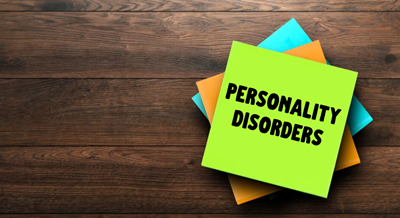
Michelle has lived experience of a personality disorder and shares her story of diagnosis and recovery with us.
In my early 20s, I had an episode of depression after a traumatic experience. I had some counselling, but it wasn’t consistent. I was confused by my feelings once I started examining them, so I didn’t continue therapy.
I had felt like I didn’t fit in throughout childhood and was bullied at school, and so, without realizing it, I became detached. I spent most of my time reading fiction, daydreaming and living in my head.
In college, I often felt empty, one of the symptoms of emotionally unstable personality disorder (EUPD) or borderline personality disorder (BPD), though I didn’t know it then. I thought there was something wrong or broken in me. This wasn’t apparent from the outside though, as I had a group of friends, knew lots of people and flitted around talking to everyone at the college social events. I seemed to be enjoying the college experience, but the truth was that I flitted about like that because I didn’t think others would put up with me for long.
I began to experience panic attacks in third year. A GP prescribed me a benzodiazepine on a long-term basis, with no consideration to therapy. Benzodiazepines are a group of drugs that should only be taken on a short-term basis, and can have complications, such as addiction, when used for long periods. I didn’t really grasp what was happening psychologically. I feel now I shouldn’t have been left on the benzodiazepine for that long without a proper plan to help me in gaining control of my emotions and anxiety.
I gradually stopped having the panic attacks and began a career in Information Technology (IT). I did well at work, got married and did all the thing’s society prescribes as the way to live a life. I was, however, still struggling inside but suppressed it and “got on with things”.
My mental health would dip, then balance, and the cycle repeated. It often felt like I was going around without a protective outer layer that others seemed to have. My emotions would consume me at times, and it was very difficult. I abused alcohol to cope and that would eventually lead to a referral to St Patrick’s Mental Health Services (SPMHS).
I finally got help that explained what I was experiencing. It wasn’t unique. I wasn’t weird or broken. I had a diagnosis of a personality disorder.It was such a relief to have a coherent explanation and to hope that, with the correct treatment, I would experience some ease in life.
I had counseling, received an assessment by a psychologist, and had a treatment plan drawn up. Result!
How I manage my symptoms
Therapy highlighted my noisy, nasty inner critic. I spoke to myself internally in a way I wouldn’t have talked to anyone else, and would have deemed completely unacceptable if I saw someone else being treated that way. It was time to learn self-compassion!
I embarked on a 20-week programme of Compassion-Focused Therapy (CFT) and learned to be kinder to myself. I learned some short and medium meditations and mindfulness practices that really helped.
If I felt myself starting to panic, I would do a five senses exercise: picking something out of my immediate environment to represent each of the senses. So, on public transport for example, I could smell exhaust fumes; hear someone’s music from their headphones; touch the seat underneath me; taste my bottle of fizzy drink; and see a baby in a pushchair. By giving my mind specific work to do, it began to slow down and ground me.
I often use breathwork: inhale for a count of four, hold for four, exhale for four and repeat. Do this for a few minutes and the body interprets it as no longer needing to react with fight or flight.
I try to be aware of patterns and common themes when it comes to negative thoughts and feelings. Thinking about what it might mean that I find them a source of discomfort, irritation, frustration, anger or hurt.
I try to accept the stigmatizing label of EUPD/BPD and see it as just a shorthand for describing my difficulties with daily life. This means I can take ownership of my needs, reach out and ask for guidance from mental health professionals.
I try to apologize to my nearest and dearest if I lash out, so it doesn’t become a bigger thing than it needs to be.
I tell myself I am doing the best I can, I am good enough and lots of people I see as coping with life are likely finding it problematic or difficult too.
Other things that help are playing with my dog, meeting friends for long chatty lunches, listening to music in the car. I’ve even taken up gardening.
I think about what I am grateful for. It might simply be that I was able to get out of bed, wash and get dressed, because, when I was depressed, that seemed almost impossible. Or it might be a new show I’ve discovered that I really enjoy. Silliness has its place in my life, and I go to plenty of comedy gigs.
What I'd like you to know
If you’ve recently received a personality disorder diagnosis:
- Know that you are one of many and that others have paved the way forward to an easier life. It isn’t the end of the world, despite it maybe feeling like that at first. You can get through it and there is probably no rotten thought of yours that hasn’t been thought by someone else! So, you aren’t the only one finding life almost unbearable at times: realizing that is very comforting and reassuring.
- Use the opportunity to work with mental health professionals. They are there to help and really seem to be unshockable. Believe me, I’ve tried!
If you know someone with a personality disorder diagnosis:
- Know that their behavior is often an unhelpful coping method to escape, rather than deal with problems. They did the best they could in finding a way to survive in the past and that method no longer works for them; this is very difficult for them. It’s similar to finding out that the way you walk isn’t right and you need to totally relearn how to do it.
- Educate yourself. If they were diagnosed with a little-known cancer, you would want to know more, so don’t let this be any different.
- Remember that all their behavior is not automatically because of the disorder; sometimes they are simply tired or frustrated or whatever human emotion they are experiencing. Respect that and don’t inadvertently use their diagnosis against them.
- Know that they want to get better; they wouldn’t choose to feel the way they do and they deserve some joy and contentment in life.
Michelle is a member of the Service User Advisory Network in SPMHS. The views and opinions expressed here are the author’s own.
See more
Continue to…
Finding the way back from an eating disorder


